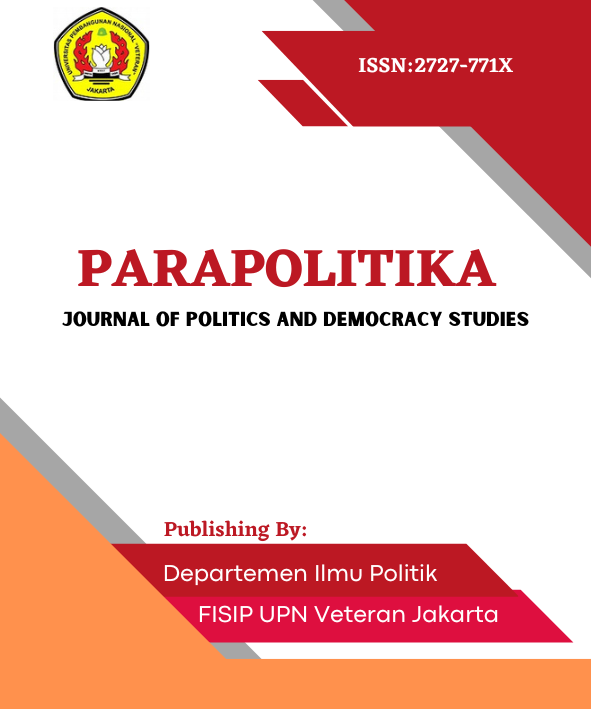REFORMULASI SISTEM PERENCANAAN PEMBANGUNAN NASIONAL DENGAN MODEL GBHN SEBAGAI HALUAN NEGARA
DOI:
https://doi.org/10.33822/jpds.v2i2.5902Keywords:
MPR, Haluan Negara, Supremasi Konstitusi, Demokrasi Konstitusional, Tipe ParlemenAbstract
The change in the status of the MPR from the highest state institution to a state institution has eliminated the role of the MPR in setting outlines for state policy. Reformation does provide a political spirit and a new perspective as reflected in the amendments to the 1945 Constitution of the Republic of Indonesia, but the resulting impact is the loss of the continuity between the government and regional governments, and at every change of President. This is reflected in the vision, mission, and work program of the elected President (which is further formulated as the National RPJM / RPJMN) which turns out that in several ways (regarding the material and direction of program achievement) it is different from the vision, mission and work program of the Regional Head (Governor, Regent and Mayor) are elected, and there is no legal consequence whatsoever, because there is no single norm that regulates it. The method used in this paper is a political research method that departs from an analysis of political ideas, political institutions, political attitudes and behavior, as well as policy decision makers and political networks. The purpose of this research is to find out what form of law is most appropriate for
bringing back GBHN in the Indonesian constitutional system, which institution is most appropriate for producing the GBHN, and through what kind of mechanism is the most appropriate. Therefore, the results of the analysis in this paper are to ensure the continuity of development in Indonesia today, urging the need to re-attend the State Policy Guidelines in the form of MPR Decrees produced by the MPR through the amendment mechanism of the 1945 NRI Constitution.
References
A. Aco Agus, Sangkala Ibsik, Firman Muin. “Aspirasi Mahasiswa Fakultas Ilmu Sosial Universitas
Negeri Makassar Tentang Wacana GBHN Ditinjau Dalam Perspektif Ideologi Pembangunan.”
Jurnal Ad’ministrare 3, no. 2 (2017): 133–36.
Arend Lijphart. “Société Québécoise de Science Politique Review Reviewed Work ( s ):
Democracies : Patterns of Majoritarian and Consensus Government in Twenty-One Countries
by Arend Lijphart Review by : Grant Amyot Source : Canadian Journal of Political Science /
Revue Ca.” Canadian Journal of Political Science 18 (1985): 27–30.
Bambang Prijambodo. “Reformulasi Sistem Perencanaan Pembangunan Dengan Model GBHN
Sebagai Haluan Penyelenggaraan Negaa.” BAPPENAS RI, 2017.
Bambang Sadono. “Mencegah Bola Liar Amandemen UUD 1945.” Media Indonesia. 2016.
Bimankalid, Triandi. “ANALISIS YURIDIS GAGASAN PEMBERLAKUAN KEMBALI GARIS
BESAR HALUAN NEGARA (GBHN) SEBAGAI PANDUAN PEMBANGUNAN
Forum Rektor Indonesia. Naskah Akademik Mengembalikan Kedaulatan Rakyat Melalui Penyusunan
GBHN Kepada Penyelenggara Negara. 2014. Surakaarta: UPT UNS Press.
Jember, Pusat Kajian Pancasila dan Konstitusi Fakultas Hukum Universitas Jember. Kajian Akademik
Reformulasi Haluan Negara Model Garis Garis Besar Haluan Negara. 2017. Badan Pengkajian
MPR RI,
Risalah Sidang BPUPKI. 1998. Sekretariat Negara Republik Indonesia,
https://doi.org/10.15713/ins.mmj.3. Jakarta.
MPR RI. “Keputusan MPR RI Nomor 4/MPR/2014 Tentang Rekomendasi MPR RI Masa Jabatan
-2014,” 2014.
———. Ketetapan MPR RI Nomor I/MPR/2003 Tentang Peninjauan Terhadap Materi Dan Status
Hukum Ketetapan MPRS Dan Ketetapan MPR RI Tahun 1960 Sampai Dengan Tahun 2002.
Sekretariat Jenderal MPR RI, 2014.
———. Undang Undang Dasar Negara Republik Indonesia Tahun 1945. Jakarta: Sekretariat
Jenderal MPR RI, 2014.
Figure, Supplementary. Buku BPUPKI, n.d. https://doi.org/10.15713/ins.mmj.3.
Forum Rektor Indonesia. Naskah Akademik Mengembalikan Kedaulatan Rakyat Melalui
Penyusunan GBHN Kepada Penyelenggara Negara. Surakaarta: UPT UNS Press, 2014.
Iiydonesia, Reptiblik, M Ielis Permusya, Waratan Rakyat, Majelis Permu, Syawaratan Rakyat,
Republik Ind, and O N E S Ia. “Hasil Kajian,” 2019.
M. Hasbi Arbi. “UUD 1945 Dan GBHN Sebagai Kendali Yuridis Dan Politis Dalam Pembangunan
Nasional.” Variasi 4, no. 12 (2013): 10.
Ministry of Economic Affairs, EPU. “Economic History.” malaysia, 2018.
MPR RI. Ketetapan MPR RI Nomor I/MPR/2003 Tentang Peninjauan Terhadap Materi Dan Status
Hukum Ketetapan MPRS Dan Ketetapan MPR RI Tahun 1960 Sampai Dengan Tahun 2002.
Sekretariat Jenderal MPR RI, 2014.
———. Undang Undang Dasar Negara Republik Indonesia Tahun 1945. Jakarta: Sekretariat
Jenderal MPR RI, 2014.
Muharsono. “Pentingnya GBHN,” n.d., 192–200.
RI, Sekretariat Jenderal MPR, ed. Ketetapan MPR RI Nomor I/MPR/2003 Tentang Peninjauan
Terhadap Materi Dan Status Hukum Ketetapan MPRS Dan MPR RI Tahun 1960 Sd Tahun
Jakarta, 2007.
Siti Marwijah. “Garis-Garis Besar Haluan Negara Sebagai Penentu Arah Dan Strategi Rencana
Pembangunan Indonesia Siti.” Rechtidee Jurnal Hukum 9, no. c (2014): 88–103.
https://doi.org/10.15713/ins.mmj.3.
Susanto, Mei. “Wacana Menghidupkan Kembali GBHN Dalam Sistem Presidensil Indonesia.”
Penelitian Hukum De Jure 17, no. September (2017): 19.
Walters, Mark D. “Dicey on Writing the Law of the Constitution.” Oxford Journal of Legal Studies
, no. 1 (2012): 21–49. https://doi.org/10.1093/ojls/gqr031.
Yudi Latif. “Basis Sosial GBHN.” Kompas. 2016.






